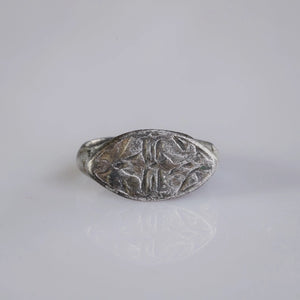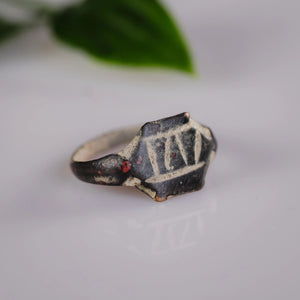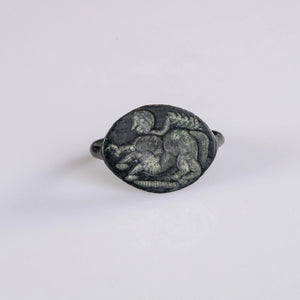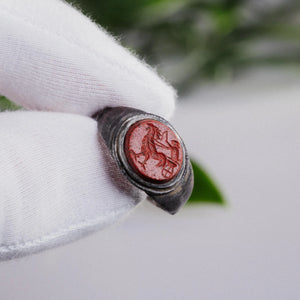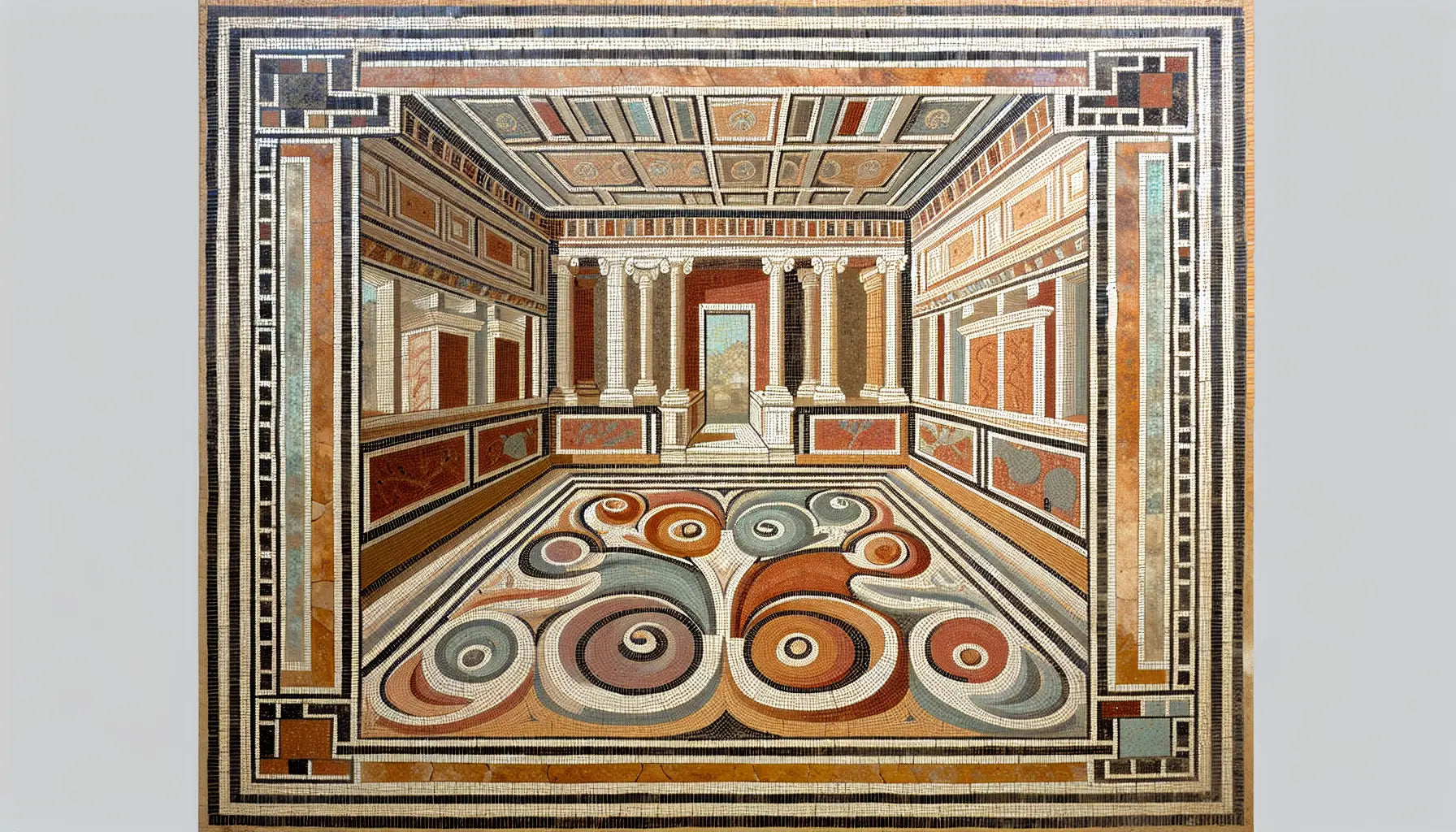Interesting facts
Hadrian, who ruled the Roman Empire from 117 to 138 AD, remains one of the most fascinating figures in ancient history. Not just a military and political leader, Hadrian was also a thinker—a man deeply engaged with philosophy, culture, and the human condition. Among the many traces he left behind, his famous poetic epitaph stands out for its emotional depth and philosophical richness. It captures, in a few poignant lines, the universal pondering on life, death, and the soul’s journey beyond the physical world.
The quote runs in Latin as: “Animula vagula, blandula, hospes comesque corporis, Quae nunc abibis in loca?” which translates roughly to: “Little soul, wandering, gentle, guest and companion of the body, where will you go now?” These words, attributed to Hadrian, reveal much about how he viewed existence, far beyond the usual narratives of empire and conquest. For those inspired by the depth and richness of Hadrian's era, exploring authentic Roman artifacts can be a fascinating journey. The Aurora Antiqua Store offers a remarkable collection of Roman-era relics that capture this spirit, such as the unique silver pieces from the time of Hadrian himself. Delve into this collection at AuroraAntiqua.store. These treasures not only provide a physical connection to Roman history but also a tangible sense of the era's intricate artistry and cultural depth.

Understanding Hadrian’s Quote: A Stoic Reflection on Life and Death
The phrase “Animula vagula, blandula” immediately evokes a sense of tenderness and introspection. The “little soul” is described both as “wandering” and “gentle,” suggesting a fragile, restless essence delicately intertwined with the body. Hadrian calls the soul a “guest and companion,” highlighting the temporary and somewhat uncertain relationship between the soul and the physical vessel it inhabits.
There is a beautiful haunting quality here—not a triumphant claim of eternal life, but a contemplative question about what happens after death. “Where will you go now?” mirrors the timeless human inquiry into the afterlife or the possibility of oblivion.
Hadrian’s reign was marked by a blend of practical governance and philosophical depth. He was strongly influenced by stoic philosophy, which emphasizes rationality, acceptance of fate, and the impermanence of earthly things. The quote encapsulates this outlook: a serene and respectful acknowledgment of death, rather than fear or denial. A visual representation like that of the 'Diana' Roman Silver Intaglio Ring, reflects this intricate weaving of thoughts and artistry that flourished under his rule. This exquisite piece captures not only the elegance of the era but the deeper philosophical musings of leaders like Hadrian. Such artifacts serve as a profound bridge, linking our modern perceptions to the wisdom of the ancients.
Hadrian’s approach contrasts with the grandiose and often aggressive imagery typical of Roman emperors. Instead, here we see a man humbled by mortality, keenly aware of the soul’s precarious journey.
The Broader Philosophical Context of Hadrian’s Words
To fully appreciate this quote, it helps to place it within the Roman tradition of stoicism and intellectual inquiry. Stoicism was not just a philosophy but a practical guide on how to live a virtuous life in the face of uncertainty and hardship. Roman thinkers like Seneca and Marcus Aurelius, who came after Hadrian, famously practiced stoicism as a means to cultivate inner peace and ethical strength.
Hadrian seemed to internalize these values deeply. His quote isn’t an abstract meditation but an intimate farewell, possibly spoken on his deathbed. It captures the soul as something that both belongs to and yet transcends the body. The imagery of the soul as a “guest” and “companion” is particularly evocative, implying that human identity is a dynamic interplay between body and spirit—one that must inevitably end.
Beyond stoicism, Hadrian's musings also echo themes from other philosophical traditions circulating at the time, including Platonism and early elements of Neoplatonism, which explored the soul’s immortality and its journey beyond the physical plane. This blending of ideas highlights Hadrian's openness to multiple perspectives on existence and the afterlife, making his brief quote a rich tapestry of ancient thought.
Hadrian’s Legacy Beyond the Quote
Hadrian’s famous quote is only one piece of a complex legacy. His rule is remembered for consolidating and stabilizing the empire rather than relentless expansion. He famously commissioned the construction of Hadrian’s Wall in Britain, a defensive fortification marking the northern limit of Roman territory. This act alone speaks volumes about his strategic mindset: knowing the limits of power and choosing sustainable boundaries rather than endless conquest.
Moreover, Hadrian was a patron of the arts and architecture, fostering a cultural renaissance in Rome. He rebuilt the Pantheon and created his vast villa at Tivoli, a place that seems to distill his contemplative spirit. These endeavors reflect an emperor who saw culture and wisdom as integral to the identity and strength of the empire.
Hadrian was also deeply interested in the diverse cultures within his empire, traveling extensively throughout its vast territories. His journeys to Greece, Egypt, and the Near East weren’t just political or military but also cultural pilgrimages. He sought to understand the souls and traditions of his subjects, promoting religious syncretism and commissioning works of art that celebrated the empire's mosaic of peoples. This empathy and curiosity mark him as a unique figure among Roman emperors.
Through his words and deeds, Hadrian represents a moment in Roman history where leadership was as much about philosophical maturity as it was about political authority.
The Roman Empire’s Cultural and Philosophical Richness
Hadrian’s reign is an entry point into the broader cultural and intellectual legacy of the Roman Empire. This epoch was not merely about military might and governmental control but also about profound engagement with art, language, philosophy, and spirituality.
Roman thinkers absorbed and adapted Greek philosophy, stoicism in particular, giving it a new dimension in the context of ruling a vast, multicultural empire. The quote from Hadrian reflects this synthesis of ideas—melding personal reflection with a universal human condition.
In this way, his words resonate not only with historians but anyone interested in the eternal questions of identity and mortality. The Roman Empire’s cultural richness extended beyond philosophy and architecture. Literature flourished, theaters thrived, and public baths served as hubs of social interaction. The cosmopolitan character of cities like Rome, Alexandria, and Antioch fostered vibrant dialogues between different cultures and ideas. Hadrian, as emperor, stood at the center of this dynamic world, navigating complex social and religious landscapes with an unusually reflective mind.
An Emblem of Hadrian’s Era: The ‘Diana’ Roman Silver Intaglio Ring
While Hadrian’s words speak to the soul’s journey, physical artifacts from his time provide a tangible connection to the world he shaped. Among the authentic Roman imperial-era pieces, the ‘Diana’ Roman Silver Intaglio Ring, dating from the 1st to 3rd centuries BCE/CE, stands out as an exquisite symbol of the culture and craftsmanship that flourished under emperors like Hadrian.
This ring, finely engraved and beautifully preserved, offers a glimpse of Roman artistry and the personal adornments that carried meaning and status within society. The figure of Diana, goddess of the hunt and protector of the natural world, evokes themes of strength, purity, and transition—fitting symbols for the era’s complex worldview.
Why is Hadrian’s reign considered a significant period for cultural and philosophical development in the Roman Empire?
Hadrian’s reign is regarded as significant for cultural and philosophical development primarily due to his profound engagement with diverse cultures and his embrace of stoic philosophy. His travels throughout the empire, coupled with his initiatives to integrate arts and architecture, reflected a desire to understand and incorporate the cultural and religious values of various regions. Additionally, his appreciation for stoic philosophy, emphasizing rationality and humility, influenced not only his governance style but also left an indelible mark on the cultural landscape, promoting a period of consolidation and intellectual inquiry rather than mere expansion. This made his leadership distinctive and facilitated a renaissance of cultural and philosophical thought within the empire.
Such artifacts allow us to bridge the gap between abstract philosophy and historical reality, reminding us that behind quotes and grand historical narratives were real people living tangible lives.
Wearing or even just seeing a piece like the Diana ring connects us across millennia, inviting reflection on how symbols and beliefs carry meaning and comfort. It embodies the intimate side of history, the ways in which art, religion, and identity intertwined in daily life during Hadrian's reign.

Reflecting on Hadrian’s Quote in Modern Times
Why does Hadrian’s question—“Where will you go now?”—still resonate today? Perhaps because it captures a shared human vulnerability. The uncertainty about what happens after death has preoccupied thinkers, poets, and ordinary people for millennia.
In a world increasingly driven by technology and immediate gratification, these words invite us to pause and consider our own existence more deeply. They remind us that despite all advancements, certain mysteries remain.
Moreover, Hadrian’s philosophical tone encourages us to face mortality with grace and curiosity, not fear. The image of the soul as a gentle but wandering companion not only comforts but also invites us to cherish the time we have within our mortal bodies.
Hadrian’s lyric question finds echoes in contemporary culture, from mindfulness movements to philosophical writings urging us to live with awareness of our mortality. It nudges us toward a life that values presence and acceptance—principles that, despite centuries, remain profoundly relevant.
Lessons on Leadership and Humanity from Hadrian
Hadrian’s quote also speaks to his style of leadership. Unlike the brutal or purely authoritarian figures that history often highlights, Hadrian appears as a thoughtful, self-aware ruler who understood the limits of power and the importance of humility.
His reign teaches a timeless lesson: true leadership involves wisdom, restraint, and respect for the human condition. The sustainability of an empire, like the sustainability of a life, depends on understanding impermanence and placing values beyond mere conquest.
In this sense, Hadrian’s reflections invite modern leaders, and indeed all individuals, to cultivate empathy and philosophical insight alongside their ambitions.
Explore Our Roman Relics
Discover NowPersonalizing Ancient Wisdom: Bringing Hadrian’s Quote into Your Life
Have you ever noticed how a simple question can open up a whole universe of thoughts? Hadrian’s brief yet profound query to his soul is one such spark. It encourages introspection—not necessarily about death alone, but about the deeper journey of the self in a constantly changing world.
By contemplating this quote, one might start to appreciate the fleeting quality of life and the preciousness of our moment here. It can inspire mindfulness and a gentler attitude toward our own “wanderings” through daily challenges.
Many find that engaging with ancient words like Hadrian’s helps ground their modern anxieties and opens space for a richer, more reflective existence.
In uncertain times, such as today’s fast-paced, often divisive world, returning to Hadrian’s tranquil questioning can offer an anchor. It reminds us to meet life with calm curiosity, embracing change and accepting limits with dignity.
The Enduring Power of Words Across Time
Hadrian lived nearly two thousand years ago, yet his simple question continues to resonate because it touches on something universal and timeless. Words have a power beyond their immediate context—they become vessels carrying human experience across centuries.
His epitaph reveals vulnerability and curiosity rather than certainty, a rare and beautiful combination. It invites readers not just to admire a historical figure but to connect with their own humanity.
In many ways, the enduring fascination with Hadrian’s quote underlines the shared threads in the human story—questions about life, death, and the soul that never grow old.
Indeed, the survival of this phrase through antiquity into modern scholarship and public imagination speaks to its emotional and philosophical weight. It reminds us how human concerns—about impermanence, identity, and the unknown—transcend place and era.
Conclusion: More Than a Quote, a Legacy of Reflection
Hadrian’s famous quote, “Animula vagula, blandula…” is more than a poetic epitaph. It is a window into the mind of a Roman emperor who balanced power with philosophy, responsibility with tenderness.
This brief, haunting question continues to inspire reflection on the nature of existence, leadership, and mortality. It reminds us that no matter how vast or enduring an empire might be, the fundamental journey of the soul remains a deeply personal and universal mystery.
By engaging with Hadrian’s words and the rich cultural artifacts of his time, we gain insight not only into ancient Rome but into the eternal human quest for meaning.
The Roman Empire, with its grandeur and complexity, offers countless lessons—among them, the value of humility and stoic calm in the face of life’s greatest questions. Through Hadrian’s legacy, both in his quote and in the echoes of his era’s craftsmanship, we find a profound invitation to ponder where our own soul might wander next.
In embracing this ancient wisdom, we also connect with a lineage of thinkers and leaders who dared to ask the difficult questions and face their own mortality with openness. It’s a reminder that leadership, culture, and philosophy are intertwined, shaping not only the fate of empires but the hearts of individuals through time.
What is the meaning behind Hadrian's famous quote?
Hadrian's quote, "Animula vagula, blandula," reflects on the transient nature of life and the soul's journey after death. It reveals a philosophical outlook rooted in stoic tradition, highlighting the temporary and delicate relationship between the soul and the body.
How did Hadrian's stoic beliefs influence his rule?
Hadrian's stoic beliefs influenced his rule by promoting rational governance and acceptance of life's impermanence. He focused on stabilizing the Roman Empire and integrating diverse cultures, reflecting a leadership style marked by wisdom and empathy.
Where can I find artifacts from Hadrian's era?
You can discover artifacts from Hadrian's era, such as the ‘Diana’ Roman Silver Intaglio Ring, at auroraantiqua.store. These pieces provide a tangible connection to the Roman Empire's rich cultural history.
